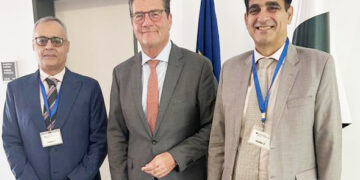KARACHI – Chairman of National Business Group Pakistan, President Pakistan Businessmen and Intellectuals Forum, All Karachi Industrial Alliance, and former provincial minister Mian Zahid Hussain said on Monday that the political situation has started to normalize after several months of turmoil.
The business community is optimistic about the upcoming election and the prospect of a stable, elected government as a result, he added.
Mian Zahid Hussain said that people hope that the elected government will be able to get the country out of its problems with the help of a public mandate.
Speaking to the business community, the veteran business leader said that apart from the election, satisfactory news is coming from many sides. The IMF review is also expected to be completed soon, as a result of which Pakistan will be able to get a tranche of $710 million.
The stock market has crossed 56 thousand points, and a five percent export increase has also been noted in the last month. Remittances increased in October after a long period of decline. The volume of remittances last month was 2.5 billion dollars, 9.6% higher than September and 11.5% higher than October last year.


The business leader said that the increase in remittances was not unexpected. The dollar gap in the open and interbank markets has narrowed, so many people are now sending money through banks instead of Handi.
If the operation against dollar smugglers and hoarders is continued in the same way, the situation will improve further.
Mian Zahid Hussain added that for the six months before October, the volume of remittances was 2 to 2.2 billion dollars, after which there has been a clear change in the situation. He attributed the improvement to the emigrants from Saudi Arabia and the United Arab Emirates.
He further said that the stabilization of the value of the rupee and reforms in the rules of exchange companies by the central bank have also had a positive impact on the situation.
“If there is political stability as a result of the election, domestic and foreign investment will also increase,” he said, adding that under SIFC, the prospects of huge foreign investment are also bright, which will have a positive impact on business, employment, production, and exports.
Mian Zahid Hussain observed that Pakistan’s exports equal 10.5% of GDP, while Bangladesh’s exports are 12.9% of its GDP, Sri Lanka’s are 21.5%, and India’s exports are 22.4%.
There is scope for import substitution in energy and agriculture, which can save eight to ten billion dollars.


















